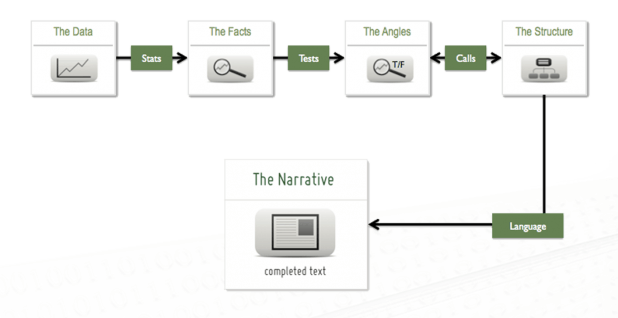 A few weeks ago, I wrote a blog post about Narrative Science and the idea around algorithms replacing humans for news stories.
A few weeks ago, I wrote a blog post about Narrative Science and the idea around algorithms replacing humans for news stories.
At the time, I based my cynical piece (as is my custom) on the things I’d read in Wired, Crain’s, Slate, and The Atlantic.
My biggest issue with the company is the idea that a computer could replace, not only part of my livelihood, but my passion. But where the really interesting conversation happened was in the comments (as is always the case).
Some of the comments included things such as:
- An algorithm can’t say words such as shiznit and bouyah.
- If keywords and SEO are all that’s important, a computer does that better than humans.
- Could computer-based writing become better at facts than humans?
- We don’t know enough about the art of language to make a computer that knows it even better than humans.
- This is a copout, a new way to spam, and users will see through it, get tired of it, and move away.
- Will this be 90 percent because people will be writing that much less content? Or is that a 9x increase in content, rewritten and repurposed by machines? (In response to their founder saying 90 percent of all content will be written by computers in the next 15 years.)
- The nuances and subtle touches that go into story telling aren’t something that you can teach.
And you know what? I agreed with all of these comments. You can’t teach a computer the things humans can do with the language. What’s next? A Pulitzer Prize for the pretty black laptop over there in the corner?
And Then…
I took a phone call from Stuart Frankel, the CEO at Narrative Science. It’s pretty rare anyone gets me on the phone if they’re not on my team, a client, or a prospect we’re likely to close soon. So the fact that I spent nearly an hour on the phone with him speaks volumes for what they’re doing over there.
And he changed my mind. Not entirely (I still don’t think a computer-based story could win a Pulitzer), but I’m thinking about it differently now.
He started off by showing me the process they use in order to create a computer-based story.
What’s interesting about this process is all of these pieces have to be there in order for the computer to write stories about Little League games or earnings reports or real estate in smaller markets that don’t typically get attention.
For instance, Forbes will do earnings reports for the Fortune 50 every quarter, but every other public company gets ignored because they don’t have the time, the human resources, or the budget to focus on everyone else.
An algorithm can take the data, the facts, the stats, and the angles and create a structure around earnings reports for the other 450 Fortune 5oo companies. And it can do it in seconds.
So why not let a computer write something no one was going to write anyway, but people are interested in reading about? It doesn’t matter if it’s five or 500 people because it takes so little time to produce.
Algorithms are writing stories humans either don’t want to write or don’t have the time to write…and they’re doing it in four seconds instead of 40 minutes.
It’s Inevitable
I consider myself pretty forward-thinking when it comes to technology. I love new advances, tools, and changes…especially if it means I’m going to get more efficient at my job.
So I try to keep an open mind, especially when it’s something that rubs me the wrong way like this has done.
Stu said:
We think if a story can be generated by data, it will be. We’re not shorting humans. We can generate parts of a story from the data that a computer is better at pulling, and a human can add the color or interviews conducted to broaden the appeal.
So I’ve softened my opinion. There are plenty of parents and grandparents who want the play-by-play of the Little League game the local paper just can’t write. Now they can have all of the information they need.
It doesn’t mean my livelihood or passion is affected. After all, I’m gunning for a Pulitzer (someday), not the Little League game recaps or Fortune company earnings reports.
